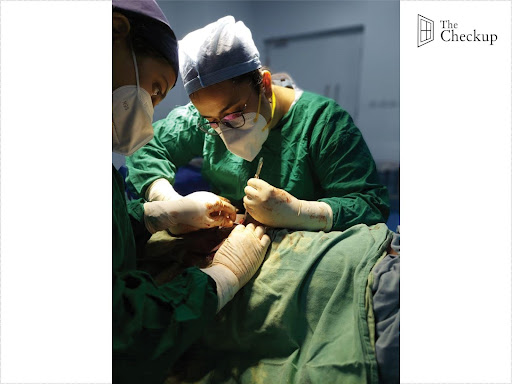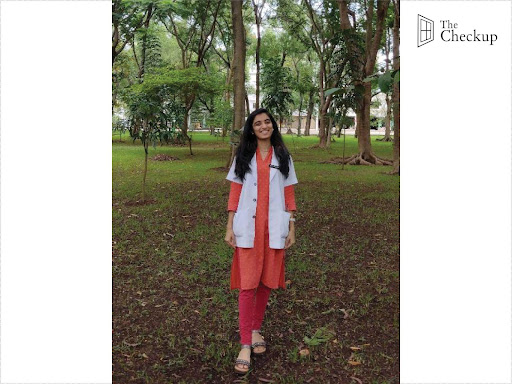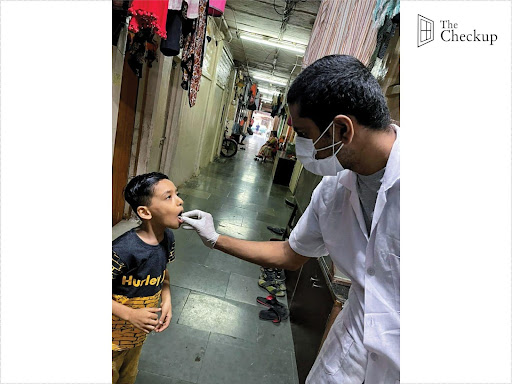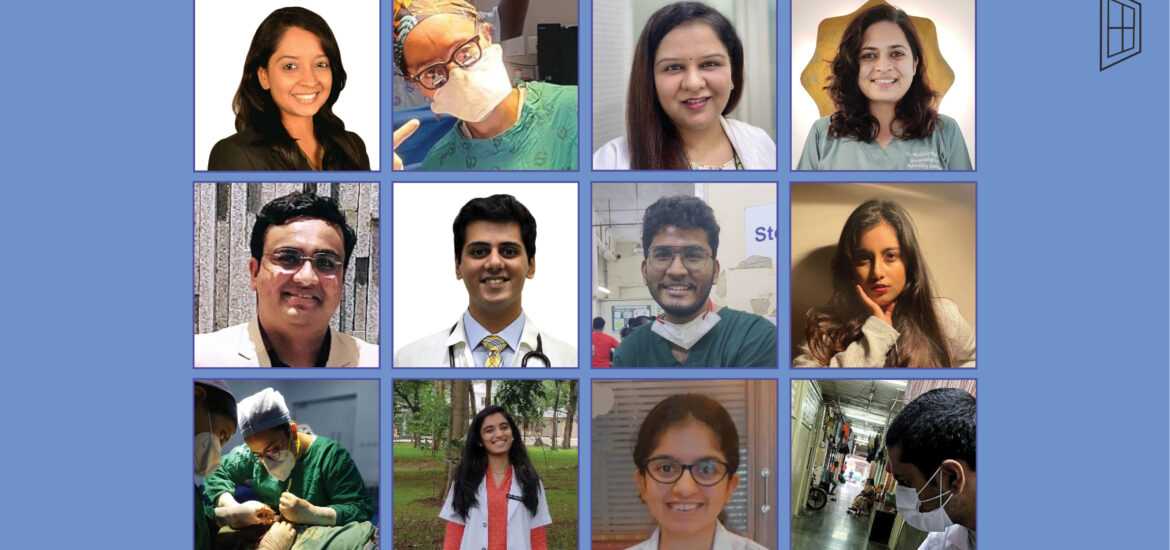This article is edited and compiled by Vaibhavi Kodnani.
In 2022, for World Health Day, WHO is focusing on “The Effect of Climate on the Health of People”. We asked doctors and medical students worldwide to express their views and experiences in this regard. Let us all learn about this crisis from each other and pledge to take action in the coming years to save the planet Earth that has given us so much!
‘I started noticing my flare-ups whenever it got extremely dry in winter or hot in summer’: Dr Meenakshi Maruwada

Dr Meenakshi Maruwada
Dr Meenakshi Maruwada is a dentist by profession and writer by passion. She hopes to change the way people perceive health-related information and use it to live better, safer lives.
I was diagnosed with atopic dermatitis a year ago after going to multiple doctors and dermatologists. This pompholyx eczema turned out to have a spectrum of symptoms. I started noticing my flare-ups whenever it got extremely dry in winter or hot in summer. Climate change is said to have altered the allergenicity of pollen, which in turn increases the symptoms of atopic dermatitis during the pollen season. Little did I know that climate change would not just affect my health but significantly impact my lifestyle.
‘In South Africa, paediatric burn injuries contribute significantly to the burden of childhood diseases’: Dr Yentl Gamiet

Dr Yentl Gamiet
Dr Yentl Gamiet is a paediatric surgeon from South Africa.
In South Africa, paediatric burn injuries contribute significantly to the burden of childhood diseases. The winter season heralds an exponential increase in these injuries, with flame burns and severe hot water burns resulting in catastrophic outcomes for entire families. Public health initiatives aimed at interventions seem feeble in the face of the desperate socio-political-economic state of many communities. Informal settlements erected from combustible materials and illegal electricity connections make these fires inevitable. Adding to that, neglect of children, unemployment, and substance abuse – make winter the perfect storm.
‘As a dermatologist, I would like to highlight some effects of the harsh climate conditions on your skin health’: Dr Sonam Ramrakhiani

Dr Sonam Ramrakhiani
Dr Sonam Ramrakhiani is the founder dermatologist and medical head of Srishti Skin Clinic.
Climate change science points to an undesirable increase in sea surface temperature, increases in the severity of extreme weather events, declining air quality and collapsing natural systems due to increases in greenhouse gas emissions.
The direct and indirect health results of such a global imbalance include ones ranging from mild derangements to death. Heatwaves are already known to kill people through heatstroke and aggravated respiratory and cardiac issues. Worsening air quality is directly proportional to worsening allergies and reactions both young and old. Extreme rainfall, landslides, and floods are inviting waterborne disease outbreaks.
As a dermatologist, I would like to highlight some effects of the harsh climate conditions on your skin health.
- Early Summers have already seen an increase in severe cases of sunburns and UV radiation-related eruptions.
- Dehydrated skin looks dull and lifeless. It has increased the demand for patients opting for injectable hydrating solutions.
- Increasing smoke and particulate matter is the most common trigger for increasingly severe Airborne contact dermatitis and atopic dermatitis.
- Cumulatively increased UV rays reaching the Earth and the worsened air quality trigger the production of free radicals, which are well known to up the inflammation in the body at the cellular level.
- Pro-inflammatory changes speed up signs of ageing like premature greying, increased wrinkles, skin sagging and pigmentation.
- Worsening food quality due to deteriorating soil, air and water quality has been primarily recognised as a reason for both immune weakening and a hyperactive immune system. A weak immune system makes the body susceptible to infections, while an overactive immune system can trigger autoimmune conditions like alopecia areata and vitiligo.
- Increased use of plastics has already proven to cause hormonal fluctuations and increase the risk of cancers.
As a health care expert, I must add that death may seem the most dreaded of all complications, but a negative impact on the survivors’ quality of life is the most difficult to handle.
Strategies to minimise health-related burdens of climate change need to focus on improving responses to many ongoing issues occurring with greater frequency, intensity and geographic range.
To conclude, now climate change is a mainstream issue and must be framed as a public health concern.
‘We have so many young patients, both men and women having fertility issues’: Dr Mridula Raghav

Dr Mridula Raghav
Dr Mridula Raghav, MS Obstetrics and Gynaecology, FRM (ICOG), is a consultant gynaecologist and infertility specialist at Nimaaya women’s centre for health, and 21st-century hospital, Surat. Her special areas of interest are women’s health, infertility, high-risk obstetrics, and women empowerment.
As per the records, 2020 was the hottest year. We are experiencing climate change in every aspect of life, health being one of the major concerns. Being infertility experts and gynaecologists, we have so many young patients, both men and women having fertility issues like low ovarian reserve, low sperm count, and poor sperm quality. We cannot prevent man-made environmental toxins from entering the human body through water and air. These being essential to survival will continue having an impact on human health. Fertility is crucial for the continuation of our species, but the picture is bigger – Cancer is one of the worst hazards caused secondary by climate change. We can only hope, pray and pledge to make the Earth a better place to live and not end up with humans destroying human hood.
‘International cooperation amongst governments could be a catalyst to the change, the same way it helped avert the Ozone crisis a few decades back.’: Dr Sushrut M. Ingawale

Dr Sushrut M. Ingawale
Dr Sushrut M. Ingawale has completed his medical education at Seth G.S. Medical College and KEM Hospital, Mumbai and is currently working as an Assistant Professor in the Department of General Medicine. He is one of the youngest Editors-in-Chief of an international medical journal GJMS and is quite active on various literary and juxta-academic fronts.
“The World has enough to satisfy every man’s need, but not every man’s greed”, said Mahatma Gandhiji. Time and again, we have tested Mother Earth’s tolerance. Though some efforts are in place to find a new planet home, one must not forget the diamond (Earth) while searching for Gold (Mars). Charles Darwin’s theory of “Survival of the fittest” needs to be challenged by the “Survival of those who can co-exist”. Man, alone, cannot be the lone survivor. The tick-tock of climate change started decades ago, and I believe it is already too late. The only thing we need to think of is how to minimise the damage if we cannot reverse it.
Rigveda, 1/90/6: मध॒ुवाता ऋतायतेमधुक्षरन्ति सि न्धवः। माध्वीर्नःर्न सन्त्वोषधीः ॥ (Environment provides bliss to people leading their life perfectly. Rivers bliss us with sacred water and offer us health, night, morning, and vegetation. Sun bliss us with peaceful life. Our cows provide us with milk)
The earlier each world citizen realises it, the better it would be to heal our Mother Earth. The cities are the first victims. Air, light, sound and water pollution are the primary health threats, and microplastics are almost universal. Humanity needs to prioritise a few things. International cooperation amongst governments could be a catalyst to the change, the same way it helped avert the Ozone crisis a few decades back.
‘In the years to come, sicker, weaker babies will be born with long-lasting scars of deficiency diseases.’: Dr Mahin Bhatt

Dr Mahin Bhatt
Dr Mahin Bhatt is a medical intern from Mumbai with a keen interest in clinical medicine and medical research. He has received research grants from ICMR and Oncology Scholarships at Tata Memorial Hospital and King’s College. In his Final Year of MBBS, he secured the first rank in all of Maharashtra.
Climate change is estimated to affect the health of billions of people globally and will directly contribute to the added deaths of half a million people annually. With increasing temperatures, the vectors of many diseases like malaria and dengue can expand their geographical distribution. Unseasonal rains and droughts that destroy crops and starve entire populations contribute to malnutrition. In the years to come, sicker, weaker babies will be born with long-lasting scars of deficiency diseases. As deforestation rates, the transmission of simian infections increases. It might expose us to Ebola-like haemorrhagic fevers in the future.
The floods, landslides, blizzards and droughts brought on by our changing climate claim thousands of lives and negatively affect the health of all those who survive such disasters in countless ways, from fractures, burns, infections and even residual psychological trauma.
We must act decisively, and we must act now if we are to provide the generations to come the chance of a healthier and greener future, for they too shall have to weather the storms of climate change.
‘The ones in low-income and disadvantaged countries and communities will get affected first and worst by the climate crisis.’: Dr Pranav Survase

Dr Pranav Survase
Dr Pranav Survase is a trainee doctor currently interning at KEM Hospital, Parel, Mumbai. He is a strong proponent of evidence-based medicine and is quite interested in knowing and discussing public health issues and ways to resolve them.
Climate Burns, Health Hurts. The month of March 2022 experienced an extraordinary situation, a heatwave causing temperatures in the Antarctic to rise 70 degrees higher than the average. It is nothing but alarming. But apart from climate scientists, this didn’t garner any significant public attention.
There have been challenges surrounding Climate Change Communication arising mainly from ignorance or political opposition. That is why it is observed that reframing climate change to be a health concern rather than an environmental matter would lead to more engagement in understanding the seriousness.
The effect of climate change on health and the collective response to it can be compared to the Boiling Frog Syndrome Phenomenon. Its impact in terms of mortality is neither immediate nor widespread such as the COVID pandemic that sprang a knee jerk reaction by governments worldwide. It’s a gradually progressing concern, and if we fail to mitigate it scientifically, it can rise to such severity that it will spiral into a global health catastrophe.
The impact of climate change on health can be broadly summarised in three ways:
- Direct effect due to extreme temperature phenomena such as heatwaves and cold spells. Heat stress is likely to increase the risk of cardiovascular, respiratory and renal illnesses.
- Impacts that can occur due to climate-mediated changes in ecological systems. It can manifest as waterborne and vector-borne diseases, decreased crop yields and food supply shortages resulting in widespread malnourishment, air pollution triggering asthma and other respiratory diseases.
- Indirect consequences such as forced migration, impoverishment due to loss of income and livelihood opportunities, food and water insecurity and mental health problems
The list of how climate change impacts humans and its effects on health is unending, and there’s a good quality of scientific evidence backing it in the literature. But one of the most critical points to acknowledge is that ones in low-income and disadvantaged countries and communities will get affected first and worst by the climate crisis. These are the people who contribute the least to its causes and are least able to protect themselves and their families against it.
The World Health Day 2022 centres around “Our Planet, Our Health”, aiming at proactive and timely Climate Action. Thus, it calls for us to resolve this Health Day to put to use sustainable practices as an individual and also engage in local and political advocacy around climate change and climate action policies.
‘We fail to realise the damage pollution is causing because like all other modern diseases, it is a silent killer.’: Dr Aarushi Mittal

Dr Aarushi Mittal
Dr Aarushi Mittal completed her MBBS at the prestigious Maulana Azad Medical College. She is currently working as a PG Trainee in the dermatology department at GMCH, Guwahati.
As doctors, we are constantly told that the epidemiological triad of all diseases is in the agent, host and environment. Of the three, we take the environment most for granted. Do you know that pollution has taken nine years out of the average human lifespan? Did you know that while coronavirus caused lung infection last year, the lung damage was worsened by pollution? Air pollution is causing 13 deaths every minute around the world.
If we hadn’t taken care of the ozone hole and reduced the damage, then many skin cancer cases would have gone through the roof. We fail to realise the damage pollution is causing because it is a silent killer like all other modern diseases. We can discuss at length the impact of environmental destruction on us. But that will never solve the purpose. Hence, we need to make small changes in our lifestyle.
The ozone hole is an example that no damage is ever beyond control. You would not want to lose your children to health issues in the future just because you could not use jute bags in place of plastic ones. Even rotating what you eat will decrease the load to grow only one type of food item and replenish the soil with minerals required by a particular crop. The meat industry is currently one of the largest sources of pollution because meat storage causes emissions. You could consider eating more vegetarian food; it would be good for you and Mother Earth. We should never look down upon public transport, carpooling and using bicycles. The next time there’s a birthday party, try to gift a pet plant instead of dead flowers in beautiful wrapping paper.
‘I was born and brought up in Delhi, and anyone who has spent even a year there would know how extreme the weather is.’: Dr Amrita Mukhopadhyay

Dr Amrita Mukhopadhyay
Dr Amrita Mukhopadhyay is an intern at KMC, Mangalore (MAHE) and has less than a month left with med school.
When I was younger, my father always called me ice cream. I was born and brought up in Delhi, and anyone who has spent even a year there would know how extreme the weather is. It is either too cold for me, and I have to curl up in my blanket and forget about all my work, or too hot to survive without an AC which has Everest-like cooling. Even now, I am writing this in the comfort of an AC in the library.
We have all heard about climate change in recent years. Some of us even worked towards saving our planet, but have we ever thought about what impact it leaves on our health? Everybody talks about the eventual extinction of humans, but what about right now? Yes, I am talking about those without homes. Dying in the middle of nowhere due to frostbites, some due to dehydration, but we privileged ones only think about them when someone brings them up.
How often have you correlated your bad mood to the rainy wet weather? How many gym days did you skip because it was too hard to get out of your blanket, or you felt lazy to walk because of the heat. We all have been victims of the common cold due to season changes. What about the impact on human lives due to floods, cyclones, and drought? I could go on and on and enlighten you about it, but a google search can give you an idea of the same.
I feel the maximum effect of the climate is on our mental health. I have always been a mental health advocate and would like to jog our memories of what we all miss out on.
Have you ever wondered if your exam would have been better if the fan was just above your head? How your Sunday picnics would have been so wholesome if it had not started raining out of the blue? We don’t even realise how the tiny things change our perspective, decisions and eventually our lives. There have been many days when I would blame myself for a bad day. But in retrospect, it was the weather, not me. These are just the acute changes. Imagine the consequences when the actual climate change is pouring over our thought processes.
‘All it took me was a few hours in nature to understand and experience the impact the environment has on the human body and mind.’: Vedavi Jeyakumar

Vedavi Jeyakumar
Vedavi Jeyakumar is a final year medical student at JNMC, Belgaum. She is also a passionate Bharatanatyam dancer, Researcher and artist. Few words that would describe her the best would be – a Seeker, a Multilinguist and an Autodidact.
I recently spent a day inside the Aarey forests located at the heart of Mumbai City. As cliché as it may sound, the sunless sky, the gentle cool breeze across my face, the petrichor, the early morning chirpings of the birds, and the humming of the insects – all felt so magical. Despite being at the heart of Mumbai, it was pristine and untouched by the city’s pollution.
As I walked through the foliage admiring the beauty of the woods, a child-like joy overflowed from within me. The feelings of anxiety, tiredness, and stress that I had before entering the forest vanished in no time. A little further in front of me were two magnificent banyan trees. I quickly climbed up the tree, sat on a branch, and let my sight behold everything that my current surroundings had to offer. As I closed my eyes to feel the gentle breeze on my face, the rustle of the leaves kept me thinking if all of this would exist a few years down the lane. Such a thought struck me because as a kid, I had witnessed a huge mangrove forest being chopped off overnight to reclaim land and construct roads. At this point, all the construction work happening in and around the forest with the human idea of development irked me.
It took me a few hours in nature to understand and experience the impact the environment has on the human body and mind. No lecture, no presentation, and no million-dollar research paper – just a few minutes in nature was all it took. It is an undeniable fact that all of us have witnessed climate change over the years. If you are unaware of climate change, it is a global or regional change in weather patterns that lasts for an extended period. Unthoughtful human activities have been escalating the rate of climate change, which in turn is affecting human health. Due to the rising temperatures, billions of people have become vulnerable to water insecurity, vector-linked diseases, and hunger linked to global heating.
The United Nations 2022 climate impact report mentions how extreme weather has already pushed billions into food insecurity as climatic changes increase the chances of simultaneous crop failure. Did you know that the nutrient content of the fruits and vegetables we consume today is not even half of what it used to be 50 years ago? No matter what diet the doctor prescribes, if the food product does not have enough nutrient content, how will a person’s health status change?
Furthermore, the UN report has also predicted mass mental health challenges during the coming years, contributing to a humanitarian crisis.
Climate change is real. I believe it should be an area of interest and concern, and every single human being on Earth should take action.
This year in 2022, I pledge to educate myself more on the impact of climate change on every organism on Earth, be conscious of my actions, and support and do activities that bring about policy changes at various levels to help reverse climate change.
#SaveSoil
‘We are coming up with worse ways to tackle the symptoms of climate change. It is a vicious cycle.’: Shreya Dave

Shreya Dave
Shreya Dave is a final year medical student studying in VIMS, Dahanu. Her home is amidst the city of Pune, but during these few years of MBBS, she has inhaled the natural air from the fields of Dahanu. It has been truly beautiful.
“Masks have been a blessing”, said my asthmatic mother as she suffered from fewer allergen and pollutant-originated episodes in the past year.
“Masks have ruined my skin, as the word ‘maskne’ has been floating around to define the acne caused by prolonged close contact with masks.”
“Wrap your hair in a scarf when you step out.”
“We will need an air conditioner in the living room too.”
“Sunscreen lotions are required to prevent skin damage.”
“Use plastic covers as there might be rain showers.”
We casually say many such statements without realising the impact climate has on our health. We are coming up with worse ways to tackle the symptoms, such as plastics, refrigerators and likewise. It is a vicious cycle, where the deteriorating climate is nibbling out on our health and in return, we are munching back at the environment. It is time to focus on saving the Earth to save ourselves.
‘While climate change evokes pictures of global warming, we must also remember that it involves a rise in sea levels, and for a coastal city, that is a harbinger of doom.’: Yash Kamath

Yash Kamath
Yash Kamath is a third-year MBBS student from Seth G.S Medical College and KEM Hospital, Mumbai.
I’m a med student in Mumbai, and here, to even walk is to invite litres of sweat and tons of fatigue. Dehydration and heat exhaustion has become the dreadful duo to look out for. In the highly humid city, one can only imagine the day of healthcare workers and other workers who have to battle the direct sun and heat for long hours. While climate change evokes pictures of global warming, we must also remember that it involves a rise in sea levels, and for a coastal city, that is a harbinger of doom. Not only will that make largely low-lying areas of Mumbai uninhabitable, but it will also mean a rise in waterborne diseases and loss of economic output for the financial powerhouse of the nation. We must work to curb climate change; however, we need to focus on battling the heatwave across the country more acutely. Wear sunglasses and caps to protect yourself from the extreme heat and light, put on sunscreen, drink lots of water, eat healthily and stay indoors and in the shade unless absolutely necessary. No one is a champ when battling nature!










